The Sustainable Bus Update: volume eight
- Like
- Digg
- Del
- Tumblr
- VKontakte
- Buffer
- Love This
- Odnoklassniki
- Meneame
- Blogger
- Amazon
- Yahoo Mail
- Gmail
- AOL
- Newsvine
- HackerNews
- Evernote
- MySpace
- Mail.ru
- Viadeo
- Line
- Comments
- Yummly
- SMS
- Viber
- Telegram
- Subscribe
- Skype
- Facebook Messenger
- Kakao
- LiveJournal
- Yammer
- Edgar
- Fintel
- Mix
- Instapaper
- Copy Link
Posted: 26 August 2020 | Sam Mehmet (Intelligent Transport) | 1 comment
Within this next edition of The Sustainable Bus Update, we summarise the most recent and standout sustainable bus purchases and developments from across the globe.
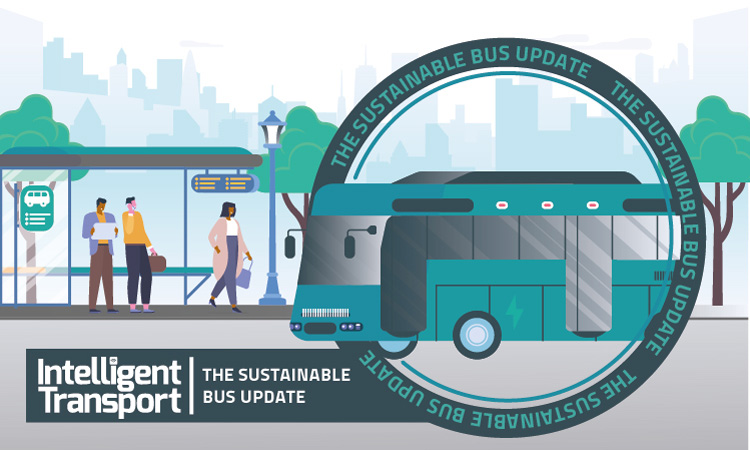

First Volvo electric buses to enter Australia
Volvo Buses and the Public Transport Authority of Western Australia (PTA) are partnering to bring Volvo’s first ever electric buses to Australia.
“Volvo aims to be a leader in electrification and to be a partner for cities that wish to implement long-term sustainable public transport solutions for their inhabitants. We have been successful in Europe and in the Americas with electrified public transport solutions and we are now looking forward to bring our first electric buses in to Australia,” said Håkan Agnevall, President of Volvo Buses.
Four Volvo Electric Buses will be delivered to the PTA as part of the existing 900 Bus Supply Agreement between Volvo and Transperth which was signed in March 2019. The Agreement includes provisions for the introduction of alternative powered vehicles into the public transport bus network when the technology became available in Volvo’s Australian product line.
“We are excited to be partnering with PTA in Perth for our first electric buses in Australia. Our relationship with the PTA now spans over a decade and in years to come the city of Perth will indeed be a Volvo city with 100 per cent of the bus fleet being Volvo. Volvo’s contract with PTA included a technology roadmap that allowed PTA to access diesel, self-charging electric and battery-electric vehicles over time. PTA can access the variety of tools available to them and match the technology to the route and need,” said David Mead, Vice President Volvo Buses Asia Pacific.
“Trialling new, green technology is a great use of our public transport network, already one of the most environmentally friendly ways to get around Perth,” said Western Australian Transport Minister Rita Saffioti.
“This is the first time we have trialled electric buses on a CAT route and I’m excited to see what commuters think about this new technology,” she said.
While handover of the first electric buses to the PTA is not scheduled until late 2021, the planning is said to be well underway. “This project is about much more than the buses. We have worked with the PTA on a number of areas including simulating the routes to create our charging strategy, charging infrastructure, understanding capital works needs in the depot, training of staff, safety elements, certification and standards compliance. That means we are creating a scalable, end to end implementation plan that can be replicated in the future,” added Mead.
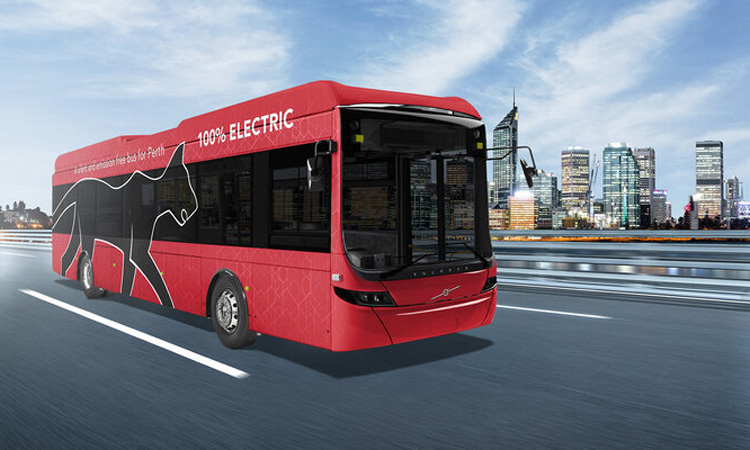

Credit: Volvo buses
More electric buses coming to the city of Sosnowiec
Public transport operator Przedsiębiorstwo Komunikacji Miejskiej (PKM) in Sosnowiec, Poland has signed a contract which covers the delivery of nine solo Urbino 12 electric and five articulated Urbino 18 electric, including the charging infrastructure.
“I am extremely pleased that the operator PKM Sosnowiec opted once again for our electric offer. Positive changes in public transport and its sustainable development will not succeed without the involvement and commitment of cities such as Sosnowiec. We are glad that we can support European cities in the development of an infrastructure that is environmentally friendly,” said Petros Spinaris, Deputy CEO of Solaris.
All of the 14 vehicles will feature the Solaris High Energy+ batteries. The 12-metres will feature four packs with a capacity of over 300 kWh, whereas the articulated units will be fitted with six packs with a capacity of over 470 kWh. The battery buses for Sosnowiec will be equipped with a central motor of 160 kW in the case of the 12-metre and of 240 kW in the case of 18-metre ones. Throughout the day the vehicles will be recharged using fast pantograph chargers lowered onto the special rails on the roof. The buses can also be charged with a conventional plug-in connector, using one of the eight 80 kW chargers placed on the premises of the depot.
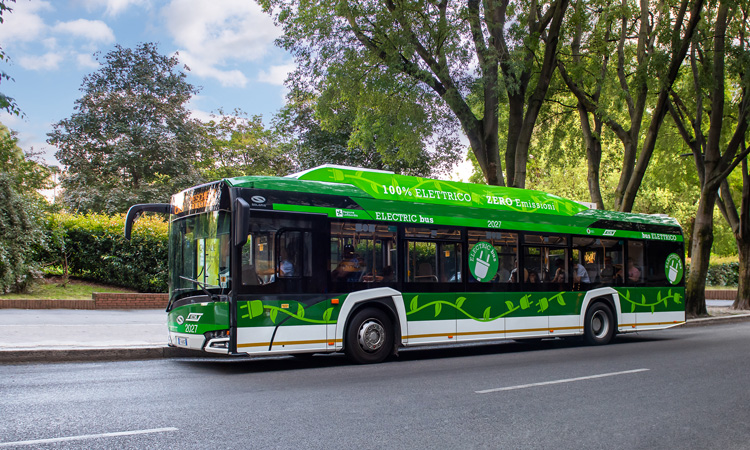

Scottish Ultra-Low Emission Bus Scheme launched
The Scottish Government has opened a new Scottish Ultra-Low Emission Bus Scheme (SULEBS). This year, the scheme will provide £9 million to help operators invest in ultra-low emission vehicles to help drive a green recovery out of the COVID-19 crisis while improving air quality.
SULEBS is said to be an “evolution of the Scottish Government’s Green Bus Fund” through which £17 million was invested between 2011 and 2018 to help operators overcome the initial capital costs of new buses. The scheme supported the introduction of nearly 500 cleaner buses across Scotland.
This new initiative focuses on ultra-low emission technologies (hydrogen electric or fully electric propulsion) which aims to support the Scottish Government’s net zero targets, its commitment to delivering Low Emission Zones and the ambitions Scotland has for transport decarbonisation.
Cabinet Secretary for Transport, Infrastructure and Connectivity, Michael Matheson, said: “The Scottish Ultra-Low Emission Bus Scheme will support bus operators and bus manufacturers in what I know is a turbulent time for the industry. The investments we will make this year will help drive forward a green recovery in Scotland while supporting our air quality objectives and our world-leading climate targets.
“With around three-quarters of all public transport journeys made by bus in recent years, equating to some 380 million trips across Scotland in 2018/19, it’s always been clear to me how critical our bus industry and its supply chain is to our wider transport objectives outlined in our National Transport Strategy.
“This is why during the COVID-19 crisis we are providing up to £109 million to increase and maintain services and why we are providing £10 million for bus priority infrastructure measures. In addition, we have maintained concessionary travel payments and Bus Service Operator Grants at pre-COVID levels and have also improved our existing offer for exhaust retrofit solutions.
“I’m pleased that our Scottish Ultra-Low Emission Bus Scheme will provide further support for our vital bus sector which plays a key role in keeping Scotland moving, improving our air quality whilst responding both to the COVID-19 crisis and the global climate emergency.”
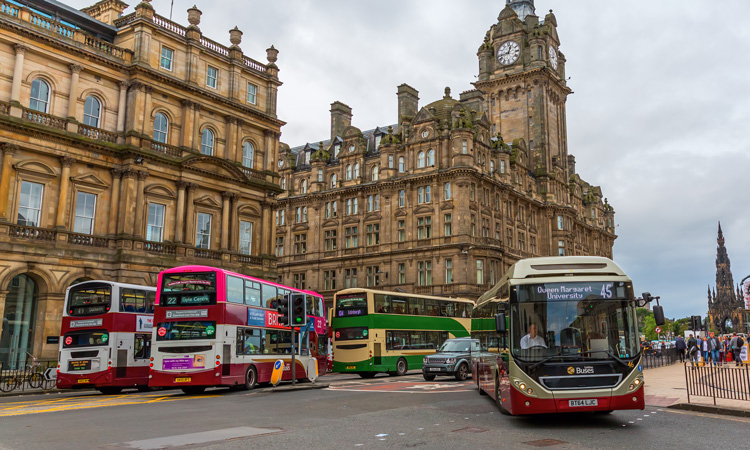

Over 500 zero-emission buses to be added to Hamburg fleet
Hamburg public transport operator Hamburger Hochbahn AG (HOCHBAHN) has announced that it is to procure up to 530 emission-free and climate-friendly buses for the years between 2021 and 2025 – the largest electric bus tender in Germany to date. Manufacturers Daimler Buses (Mannheim), MAN Truck & Bus (Munich) and Solaris (Poznan) were awarded the contract.
Henrik Falk, CEO of HOCHBAHN, said: “With the contract, we are laying an essential foundation for the complete conversion of our fleet to climate-friendly drives. For the first time in Germany, we also applied sustainability criteria in the tender. We want to take on a global responsibility in addition to our local responsibility. An important step on the way to real green mobility and a climate-neutral company.”
Markus Dietmannsberger, Project Manager at HOCHBAHN, added: “The range is one of the decisive factors for the use of battery buses. With the values now guaranteed, we can map the operating processes well and have hardly any loss of productivity compared to the conventional diesel bus. The second manipulated variable, the availability of the vehicles for use in passenger operations, is also approaching the level that we set for all of our vehicles.”
Together with other transport companies, HOCHBAHN is also striving to develop and harmonise sustainability criteria across Europe for the procurement of battery buses.
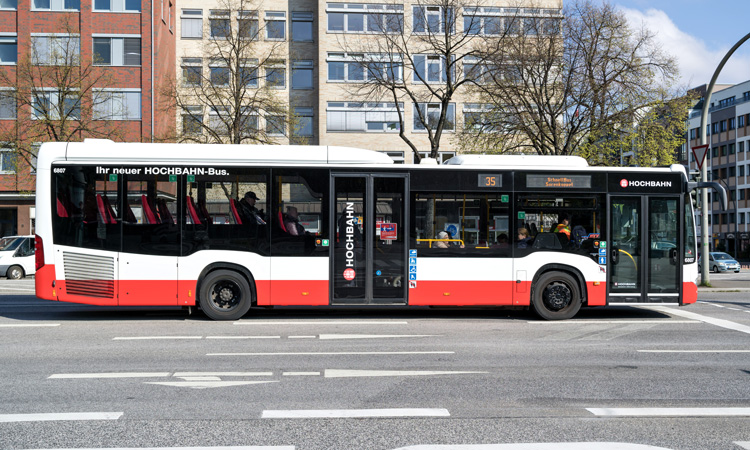

Norwegian cities invest in electric buses
Vy Buss Norge, the largest bus company in Norway, recently placed an order for a large number of Volvo electric buses for operation in Drammen and Ålesund, with delivery set for later this year. By summer 2021 Vy Buss will have 150 electric buses in operation.
“Volvo Buses has been with us from the very start of our journey to increased electromobility. Our partnership with Volvo Buses is strong, they build good-quality buses and their widespread network of dealers and workshops is very important to us,” said Ole Engebret Haugen, President of Vy Buss AS.
In Drammen, six Volvo 7900 Electric buses began operating in February 2019. This autumn they will be joined by another 22 Volvo electric, of which two are high-capacity models that can carry up to 120 passengers.
For Ålesund, Vy Buss has ordered 10 Volvo 7900 Electric, part of a larger order totalling 66 Volvo buses.
In both cases the agreement also includes the Volvo Gold Contract. This means that Volvo dealer Wist Last og Buss will take care of all service and maintenance for the electric buses on site in the customer’s depot.
“More and more cities in Europe are choosing to improve their environment and create new possibilities for urban planning by gradually electrifying their public transport. Over the past year alone we have received orders for more than 300 electrified buses in Norway and Sweden, including the recent orders for Drammen and Ålesund. Together with operators and city planners we are continuing to develop transport solutions for sustainable electrically powered public transport that meets each city’s unique prerequisites,” commented Svenn-Åge Lökken, Sales Director at Volvo Bussar Norge.
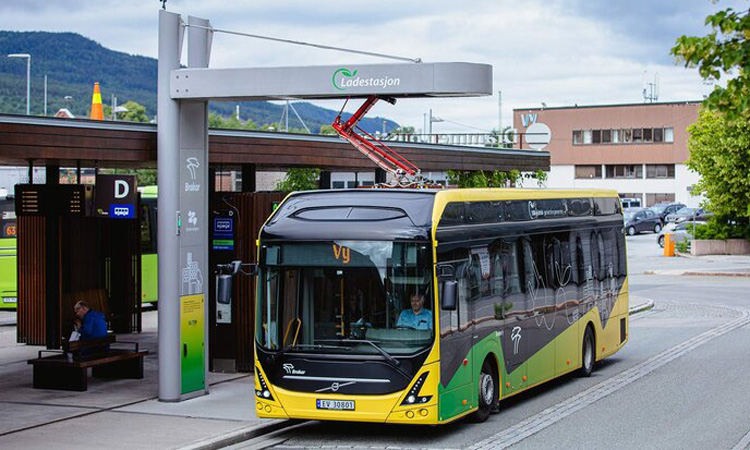

Credit: Volvo Buses
To read the previous volumes of The Sustainable Bus Update, click here.
Related topics
Air Quality, Alternative Power, Fleet Management & Maintenance, Public Transport, Sustainable Urban Transport
Related modes
Bus & Coach
Related organisations
Hamburger Hochbahn AG (HOCHBAHN), Solaris, Transperth, Volvo Buses, Vy Buss Norge









This is indeed an interesting article that clearly summarizes the outstanding sustainable developments of public transport in the world. In Australia, Poland, Scotland, Germany and Norway, cities are becoming more sustainable on providing electric, or at least less polluting, bus service. This is a great service for citizens. If we want to make our part in this planet, electric vehicles are the future.